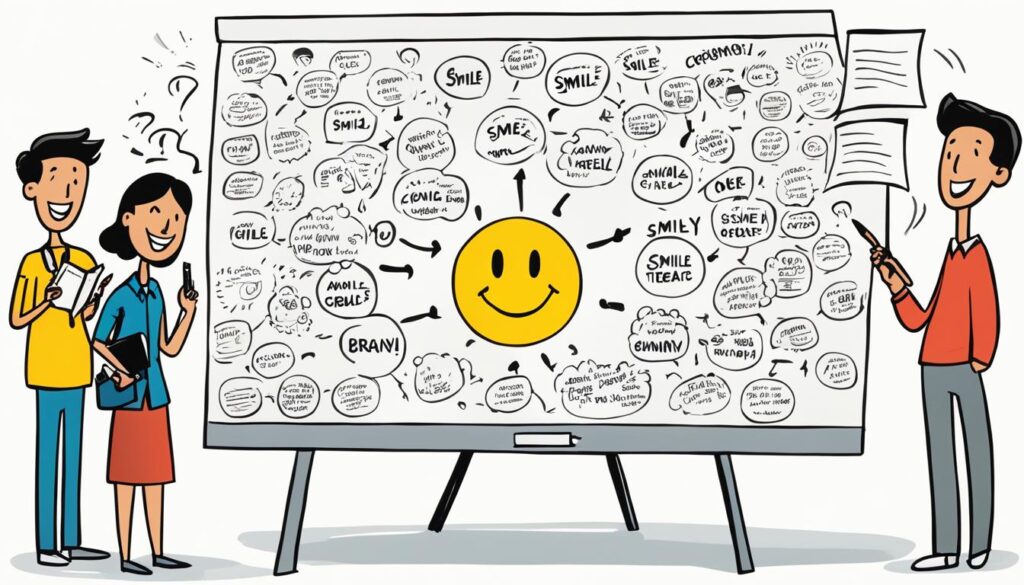When encountering someone who always has a smile on their face, it can be both uplifting and intriguing. But what do you actually call someone who is always happy and smiling? Let’s explore the various words and phrases that can be used to describe such individuals.
Words for Someone Who Always Smiles
When it comes to describing someone who always has a smile on their face, there are a plethora of words and labels to capture their radiant personality. These nicknames for constant smilers not only showcase their perpetual joy but also reflect the positive energy they exude. Let’s explore some of the enchanting terms that can be used to describe these ever-smiling individuals.
1. Smiley
One of the most endearing terms for someone who always smiles is “smiley.” This word encapsulates their cheerful disposition and the constant positivity radiating from their being. A smiley person is like a ray of sunshine, brightening up the lives of those around them.
2. Sunny
Another label that perfectly captures the essence of a perpetual smiler is “sunny.” A sunny person exudes warmth, happiness, and a carefree spirit. Their sunny disposition brings a sense of light and joy to any situation, making them a true delight to be around.
3. Smiler
The term “smiler” is a straightforward yet meaningful way to refer to someone who constantly wears a smile. It emphasizes their ability to find joy in life’s simple pleasures and showcases their unwavering positive outlook. A smiler’s contagious smile can brighten anyone’s day.
4. Blithesome
The word “blithesome” perfectly describes someone who possesses a perpetual smile. This term embodies their lightheartedness, happiness, and carefree nature. A blithesome individual effortlessly spreads their infectious positivity wherever they go.
5. Genial
If there is one word that captures the friendly and affable nature of someone who always smiles, it’s “genial.” A genial person is always approachable, kind, and radiates a welcoming vibe. Interacting with them feels like a breath of fresh air.
6. Jovial
The term “jovial” perfectly describes individuals who are always in a state of cheerful merriment. A jovial person is known for their infectious laughter, hearty smiles, and an unwavering sense of humor. Being around them guarantees moments of pure joy and amusement.
7. Affable
With an affable disposition, someone who always smiles effortlessly makes everyone feel comfortable and at ease. The word “affable” perfectly captures their friendly and approachable nature. Their constant smile is a testament to their genuine warmth and kindness.
8. Happy-go-lucky
The term “happy-go-lucky” encapsulates the carefree and optimistic nature of someone who always wears a smile. It reflects their ability to find joy in even the simplest of things and approach life with a positive attitude. A happy-go-lucky person spreads happiness wherever they go.
The Power of a Smiley Personality
I believe in the power of a smile. It is a simple yet profound gesture that has the ability to make a significant impact on both the individual and the people around them. Smiling is more than just an expression of happiness; it is a gateway to a happier and more fulfilling life.
When we smile, our brain releases feel-good hormones such as endorphins and serotonin. These chemicals not only elevate our mood but also reduce stress and anxiety. Smiling has the power to lift our spirits and create a sense of joy and positivity within us.
But the benefits of always smiling extend beyond our own well-being. A smile has the remarkable ability to brighten someone else’s day and improve relationships. When we greet others with a genuine smile, it creates a welcoming and friendly atmosphere. It fosters connection, making people feel appreciated and valued. Smiling is contagious, and by sharing our positivity, we can bring happiness to those around us.
The Power of a Positive Outlook
“A smile is a light in the window of the soul, indicating that the heart is at home.” – Unknown
Having a smiley personality can also have a positive impact on our appearance. Smiling makes us more attractive, approachable, and engaging. It radiates confidence and charm, drawing people towards us. A smile can transform our interactions and open doors to new opportunities.
It is important to cultivate a positive outlook and embrace the power of a smile. Let your smile be a reflection of your inner joy and optimism. Find reasons to smile each day, even when faced with challenges. Embrace the beauty of life and spread the warmth of your smile wherever you go.
| Benefits of Always Smiling |
|---|
| 1. Release of feel-good hormones |
| 2. Reduction of stress and anxiety |
| 3. Improvement in relationships |
| 4. Enhancement of appearance |
| 5. Creation of a welcoming atmosphere |
A smile has the power to brighten the darkest of days and bring joy to the hearts of many. It uplifts spirits, strengthens connections, and promotes a positive outlook. Let us harness the power of a smile and spread happiness to the world.
Exploring the Term “Smiley”
When it comes to describing someone who always wears a smile, the word “smiley” holds a special place. It perfectly captures the essence of a person who exudes constant joy, friendliness, and approachability. The term “smiley” has positive connotations and is often used affectionately to describe individuals with a cheery and friendly personality.
The word “smiley” evokes an image of someone with a perpetual smile, radiating warmth and happiness. It signifies their cheerful disposition and the genuine happiness they bring to those around them. A “smiley” person is like a ray of sunshine, spreading joy wherever they go.
The charm of a “smiley” individual lies in their ability to light up a room with their contagious positivity. Their ever-present smile creates an atmosphere of happiness and comfort, making everyone feel welcome. People are naturally drawn to the magnetic energy of a “smiley” person, finding solace in their constant optimism.
Let’s take a closer look at the usage of the word “smiley” with some examples:
“He is the embodiment of a true ‘smiley’ soul, always brightening up our days with his infectious laughter and positive outlook.”
“Sarah’s ‘smiley’ nature makes her the life of every party, effortlessly bringing joy to everyone she meets.”
“My grandma’s ‘smiley’ face greets me every morning, instantly putting a smile on my face and making me feel loved.”
“Lucy’s ‘smiley’ personality is like a breath of fresh air, spreading happiness wherever she goes.”
| Connotations of “Smiley” | Usage Examples of “Smiley” |
|---|---|
| The word “smiley” carries positive connotations, representing joy, friendliness, and approachability. | “He is the embodiment of a true ‘smiley’ soul, always brightening up our days with his infectious laughter and positive outlook.” |
| The term “smiley” often describes someone with a friendly and cheerful personality. | “Sarah’s ‘smiley’ nature makes her the life of every party, effortlessly bringing joy to everyone she meets.” |
| A “smiley” person is like a ray of sunshine, spreading happiness and warmth. | “My grandma’s ‘smiley’ face greets me every morning, instantly putting a smile on my face and making me feel loved.” |
| A “smiley” personality creates an atmosphere of happiness and comfort. | “Lucy’s ‘smiley’ personality is like a breath of fresh air, spreading happiness wherever she goes.” |
Next, we will delve into another term used to describe individuals who always smile – the radiant “sunny” personality.
The Radiant “Sunny” Personality
When it comes to describing someone who is always happy, relaxed, and brings positivity wherever they go, the term “sunny” is a perfect fit. A “sunny” person is like a ray of sunshine, exuding warmth, brightness, and a constant smile that lights up any room. This term is often used to describe individuals who have a cheerful disposition and wear their happiness on their sleeve.
A “sunny” person is resilient and doesn’t easily get worried or angry. They have a knack for finding the silver lining in every situation and spreading their optimism to those around them. Their constant positivity uplifts others and creates a welcoming and friendly atmosphere wherever they go.
One can identify a “sunny” personality by their infectious laughter, genuine kindness, and genuine interest in others. They have a natural ability to make others feel comfortable and at ease in their presence. Whether it’s through a thoughtful gesture, a listening ear, or a heartfelt compliment, a “sunny” person knows how to brighten someone’s day.
Examples of sentences using the term “sunny” include:
She has such a sunny personality that it’s impossible to feel down when she’s around.
or
His smile is as radiant as a sunny day, bringing joy to everyone he meets.
These sentences illustrate the meaning of “sunny” and how it is used to describe someone who embodies constant happiness and spreads positivity to others. Just like the warmth and brightness of the sun, a “sunny” person has the power to make the world a better place with their radiant personality.
Understanding the Term “Smiler”
To truly grasp the essence of someone who smiles incessantly, we must explore the term “smiler.” While words like “smiley” and “sunny” are commonly associated with friendliness and happiness, “smiler” holds an unsettling connotation that sets it apart. It is a word used to describe individuals who exhibit a continuous, and at times, disconcerting, smile.
The smiler is a fascinating character. They wear a perpetual smile that can be both captivating and perplexing. It is as if they hold a secret, a constant façade that hides their true emotions. The smiler’s demeanor can often unnerve others, for their unwavering smile hints at emotions and intentions shrouded in mystery.
When encountering a smiler, one may wonder what lies behind their incessant grin. Is it a genuine expression of happiness, an outward display of eternal joy? Or does it serve as a mask, hiding a torrent of unexpressed feelings? The smiler’s enigmatic presence invites curiosity, inviting us to delve deeper into the meaning behind their constant display of cheerfulness.
I once met a smiler who seemed eternally infatuated with life. Their smile never wavered, even when the world crumbled around them. It was as if their joy acted as a shield, protecting them from the hardships and sorrows that inevitably befall us all. But beneath that unwavering smile, I sensed a melancholy, a longing for something beyond the surface facade.
| Term | Meaning | Usage Example |
|---|---|---|
| Smiler | A person who smiles constantly | She was known as the perpetual smiler, always brightening the room with her warm and inviting grin. |
| Unsettling connotation | An eerie or unnerving implication associated with the term “smiler” | There was something unsettling about his continuous smile, as if he knew something we didn’t, hiding behind the facade of perpetual joy. |
| Use of “smiler” | Describing individuals who display a continuous and potentially disturbing smile | The smiler in the corner had an uncanny ability to unnerve those around them with their relentless grin. |
Through the usage of “smiler,” we can captu
Positive Traits of People Who Always Smile
When I think of people who always have a smile on their face, I am in awe of their constant happiness. These individuals possess a range of positive personality traits that contribute to their infectious joy. Let’s explore some of these wonderful qualities that make them shine:
- Optimism: People who always smile have a bright outlook on life. Their positive mindset allows them to see the silver lining in any situation, spreading optimism wherever they go.
- Sociability: These ever-smiling individuals thrive on social interactions. They enjoy the company of others and have the ability to create a welcoming and friendly atmosphere wherever they are.
- Empathy: Behind their constant smile lies a deep sense of empathy. These individuals have the remarkable ability to understand and share the feelings of others, creating meaningful connections and fostering a sense of belonging.
- Compassion: People who always smile are filled with compassion. They genuinely care about others and are quick to offer a helping hand or a comforting word when needed.
- Confidence: Their constant positivity is rooted in a strong sense of self-assurance. These individuals exude confidence, radiating a belief in themselves that inspires those around them.
- Gratitude: The grateful hearts of people who always smile are a true testament to their happiness. They appreciate the small joys in life and express gratitude for the blessings they receive.
“A smile is the light in your heart that shines through your eyes, and the positive traits of those who always smile simply illuminate the world around them.” – (Author Unknown)
These positive personality traits not only contribute to their own happiness, but also have a profound impact on the people they encounter. The constant smile of these individuals serves as a beacon of hope, bringing joy and upliftment to those around them.
In the world we live in, filled with uncertainty and challenges, people who always smile serve as a reminder of the power of positivity and the beauty of human connection. They inspire us to embrace optimism, kindness, and gratitude in our own lives, creating a ripple effect of happiness that spreads far and wide.
Negative Traits of People Who Always Smile
While constant smiling is often associated with positivity, it is important to recognize that there can be negative aspects to this behavior. Not all smiles are genuine and they can sometimes mask deeper issues and negative traits.
Some individuals who always smile may have a fake or two-faced nature, using their friendly demeanor to hide their true intentions. They may pretend to be amiable and approachable while harboring malicious intents beneath the surface.
Others may use a smile as a mask to suppress their true emotions. They avoid confrontations or difficult conversations by putting on a happy face, even when they may be experiencing sadness, anger, or frustration.
In some cases, a constant smile may be used to deceive others. People with malicious intentions may employ a smiling façade to gain trust, manipulate situations, or engage in deceitful behavior.
These negative traits associated with always smiling remind us that appearances can be deceiving, and it is important to be discerning and mindful of others’ behaviors and intentions.
| Negative Traits of People Who Always Smile |
|---|
| Fake Behavior |
| Suppressed Emotions |
| Avoidance |
| Malicious Intents |
Exploring Different Types of Smiles
Smiles have the power to convey a multitude of emotions, serving as windows into people’s feelings and intentions. By understanding the different types of smiles, we can gain valuable insights into the complexities of human expression. Let’s delve into the various smiles and their unique meanings:
- Duchenne Smile: Also known as the “genuine smile,” the Duchenne smile involves the activation of the muscles around the eyes, resulting in crinkling or crow’s feet. It signifies true happiness and authenticity.
- Sarcastic Smile: The sarcastic smile is characterized by a subtle grin or smirk paired with a hint of amusement. It often denotes insincerity or mockery.
- Polite Smile: The polite smile is a courteous gesture used in social interactions. It is typically formal and reserved, showing respect and pleasantness.
- Embarrassed Smile: When someone feels self-conscious or uncomfortable, they may display an embarrassed smile. This smile is often accompanied by a slight blush and signifies unease.
- Wistful Smile: The wistful smile carries an undertone of longing or nostalgia. It reflects a blend of happiness and sadness, often associated with cherished memories.
- Flirtatious Smile: A flirtatious smile is characterized by a playful and seductive expression. It is used to convey attraction and interest in a lighthearted and teasing manner.
- Disappointed Smile: The disappointed smile is a bittersweet expression accompanied by a tinge of sadness. It conveys the feeling of letdown or unfulfilled expectations.
- Sneer: Unlike a genuine smile, a sneer involves the curling of the lips, exposing a hint of contempt or disdain. It represents negative emotions and can be seen as an insult.
- Flight Attendant Smile: The flight attendant smile is the epitome of professional courtesy. It is polished, genuine, and exudes warmth, often associated with exceptional customer service.
- Forced Smile: A forced smile is one that is not genuine and is displayed out of obligation or social expectation. It may be used to mask true emotions or discomfort.
- Open Mouth Smile: An open mouth smile is characterized by the widening of the mouth, showcasing a larger grin. This expression signifies joy, excitement, or surprise.
- Closed Mouth Smile: The closed mouth smile involves a gentler, more subtle curve of the lips without showing teeth. It can represent contentment or a more reserved form of happiness.
These varying types of smiles illustrate the rich tapestry of human emotions and the intricacies of non-verbal communication. Whether it’s a genuine Duchenne smile or a sarcastic smirk, each smile holds its own unique meaning, providing valuable insights into the complexities of our emotions.
The Meaning Behind Different Types of Smiles
Smiles are like windows to the soul, revealing a kaleidoscope of emotions. Each type of smile has its own unique meaning, speaking volumes without uttering a single word. When you encounter a genuine Duchenne smile, you know it is a reflection of authenticity, triggering a cascade of feel-good hormones that uplift both the smiler and those who witness it.
However, not all smiles are born from pure joy. A sarcastic smile might hide amusement or reflect disdain, subtly conveying a different message. In social settings, a polite smile gracefully bridges the gaps between strangers, diffusing tension and forging connections. Smiles can also carry the weight of embarrassment, wistfulness, flirtation, disappointment, or even masked contempt in their delicate curves.
Understanding the intricate language of smiles unlocks the door to a realm of non-verbal communication. It allows us to navigate the ebbs and flows of human interaction with clarity and insight. A well-versed observer can decipher emotions, intentions, and hidden meanings, enriching relationships and fostering understanding. Next time you catch a glimpse of a smile, remember that it is not just a fleeting expression, but a profound reflection of our inner world.
Source Links
- https://wordselector.com/what-do-you-call-someone-who-always-smiles/
- https://hackspirit.com/personality-traits-of-people-who-always-smile/
- https://gloscience.com/blogs/blog/types-of-smiles













